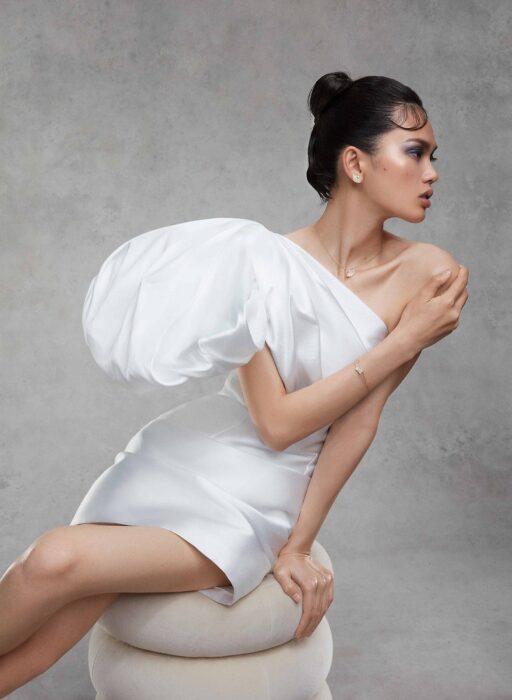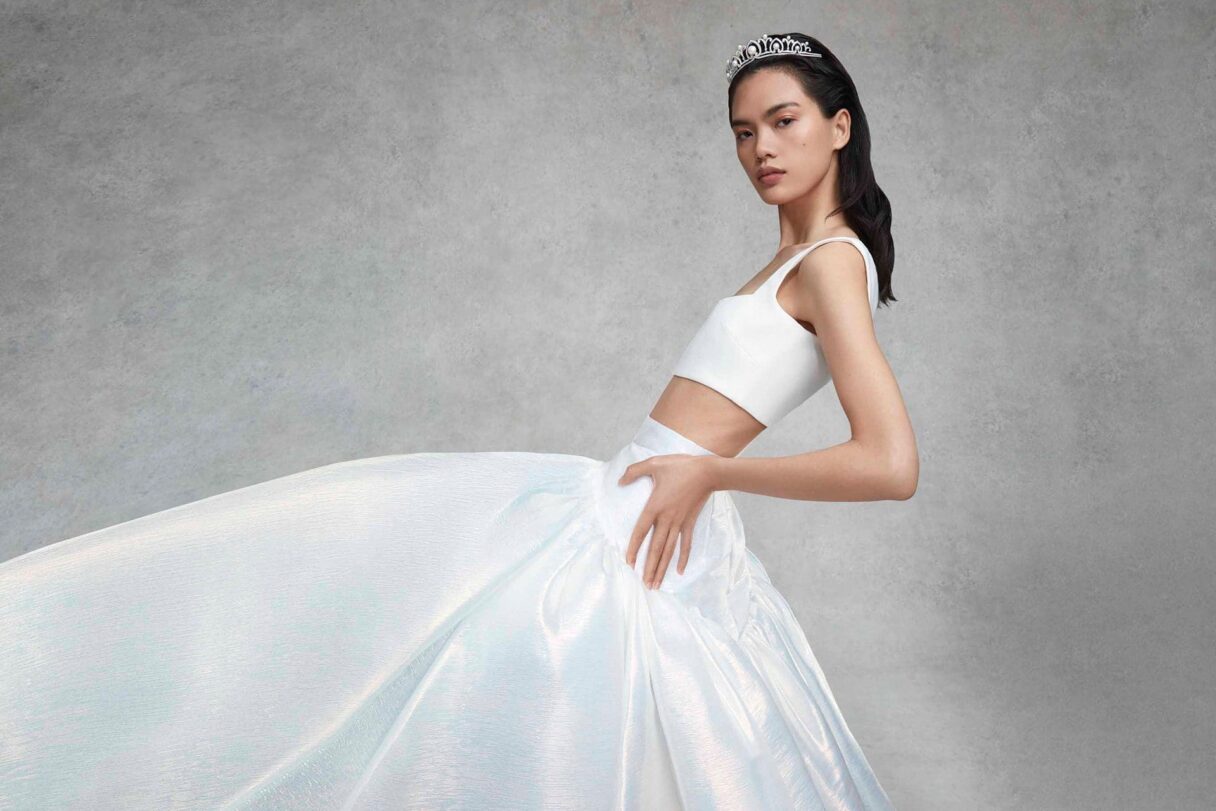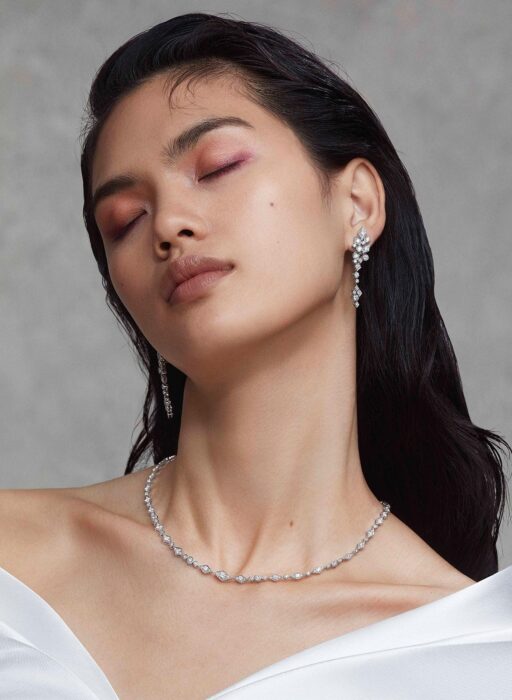
“If you’ve never had anything that’s failed, you’ve never really had anything that’s succeeded either, because you played the middle ground.” It may sound like the kind of mantra you’re likely to see overlaid on an image of a sunset and posted to Instagram accompanied by #hustleculture and #riseandgrind but for Joanne Milner, CEO of British fine jewellery brand Garrard, it’s clearly one that’s proved to be a truism.
Add to this a career that’s seen her navigate the hard-nosed worlds of corporate finance and private equity and rise to the highest echelons of the luxury jewellery industry and, on paper, it would be easy to categorise Milner as a single-minded, success-at-all-costs CEO. Which, I can confidently say after our interview, couldn’t be further from the truth.
As evidence, take Milner’s greatest career highlight. Not an award, a promotion or a successful campaign (of which there have been many) but a letter from an employee she barely knew thanking her for the way Garrard navigated the Covid-19 crisis. “It’s very rare to receive feedback,” she explains. “The higher you are in an organisation the less feedback you get, or the feedback you do get is just people saying what you want to hear. But this was something out of the blue and it came from somebody I wasn’t expecting it from. It really meant a lot.”
It is this combination of aptitude for the realities of business and a fearlessness when it comes to being entirely herself that Milner sees as her superpower – and a conscious decision she made early on in her career. “I didn’t want to be one of the lads,” she says of her early corporate experiences. “I wanted to be who I am, which is feminine, but you can be that and still be very good at your job and a good leader.”
Here she talks the trials of the modern workplace, navigating turbulent economic waters and why your best ideas will often strike when you least expect them.


I didn’t have a specific career path in mind at all. Growing up I went to my local comprehensive school, I didn’t have a wide network of people and, because I’m incredibly old, there wasn’t social media. The biggest outlet for seeing the world was television so [I wanted to do] things that I thought looked exciting. I used to watch all the American law programmes and it looked very exciting; they were having a great time and going to these sophisticated bars after work. I thought that was quite cool so I decided to study law.
After university, I changed paths and went into corporate finance and private equity. I would say to anybody that you don’t have to decide what you want to do in 20 years’ time. Just decide what you want to do today. What do you think are the most exciting opportunities in front of you? Don’t try and think too far in advance because actually, life changes in so many different ways.
Respect that there are people who know more than you. To be successful, you need to surround yourself with the very best people and, actually, it really helps to not even remotely pretend to know their jobs or what they know. I have the best team around me. They teach me about stones, about jewellery, about the industry, and what I bring they don’t have and there’s a mutual respect there. As soon as I started I took a gemmology course because I think it’s important to have a level of knowledge so that you can make informed decisions, but you really need to rely on your team.
I understand business. I know how to make businesses successful. It doesn’t really matter what that business is. My skill set is in getting into the detail of what a particular business needs to succeed. One of the things I made clear from the moment I started was that I need a team around me that I can really trust but who are empowered to make decisions. I think that’s part of why the team enjoy working here so much – because they know how much they’re valued and what they bring to the organisation.
I love business and I don’t try to be the brand. For the brand to be successful, the business has to be successful, and often people are very loyal to the brand, but not necessarily loyal to the business. I’ve always been able to balance that line. There are decisions you could make that might be very good for the business today, but would not be good for the brand in the long term so it’s always a balancing act. Personally, what I bring is understanding that line and making sure that every decision is appropriate for both the brand and the business.
Not being too involved in the industry is a positive in a way. You see things with a fresh set of eyes. You’re not ingrained in all the ‘That’s just how we do it.’ You can say, ‘Oh, so why did we do it that way?’ And sometimes it’s because it’s the right way to do it and sometimes it’s because there’s never been anything different.
I started with no network of my own. A lot of people in that industry had parents, friends of parents, etc that worked in the industry and I didn’t have that. I was starting from scratch in an industry where nearly everybody had studied accountancy and I’d studied law. It was also a very male-heavy environment and there were very few female role models. The main challenge was trying to make sure you were taken seriously and that you weren’t overlooked. I think I was probably very focused on doing the right thing and trying to please everybody.

I’m really lucky that when I started my first job, and I think this is one of the reasons why I’m successful, the team I joined was led by a female partner and that was so rare. We were the only two women on the team: I was the most junior and she was the most senior.
One of the things I’ve seen is that nurturing isn’t automatic. So often, you find that people like the fact that they’re the only woman on that team. But she really took me under her wing, she built my confidence and helped me get into a mindset of what success would look like. I honestly think I wouldn’t have stayed there had it not been for her. She was one of the smartest people I’ve met and she was very good at her job. She took absolutely no stick but she was still very feminine. That’s actually a rare combination. I decided that’s what I wanted to be.
For me, it’s about seeing people really start to believe in themselves. If they believe in themselves, they’re successful. When somebody’s done something for the first time and you can see that it’s a success and you can see them literally grow tall because of it, it’s just a really positive vibe.
The worst part of everybody’s job is those horrible decisions that sometimes you have to make in business. I have a huge loyalty to my team but my responsibility is to the business and sometimes the right decision for the business is hard. You have to make decisions you don’t want to make and have conversations you don’t want to have. I always say you know you’ve been in a job too long if that doesn’t bother you anymore. I still have sleepless nights but I think it’s good I find it really hard because it shows I still really care.
To have integrity and to be fair. In life you will always gel more with some people than others but, as a leader, you need to take that out of the equation and look at who’s doing the best job and performing well. It doesn’t matter whether you’re particularly close to them. Keeping that separation is key.
You never really switch off. I think one of the things that happens when you get into a position like mine is that you’re not necessarily doing your best work sitting at your desk. You do your best work walking home from work when you’ve got time to think. I do a lot of Pilates and often in the middle of one of those sessions, I’ll figure out a work problem. When you’re trying to switch off is actually often when you have your biggest breakthroughs. The great thing about having a young child is that, when you’re with them, they’re in your face demanding your attention. That is probably the only time when you’re in a different zone.


I think there are more women in senior roles so there are better role models. I also think there’s an understanding of a different skill set. When I started, there was one set of parameters for what people thought made a good leader and that didn’t necessarily fit naturally with the strengths that women bring. I remember reading an article on the idea of the glass ceiling and there was a study where men and women had been told to react to an issue in exactly the same way. They said the same words, in the same way, and the outcome from the study group was that they felt the woman was harsher and not as fair.
There was a subconscious expectation that women are more caring. I actually think that, in the right way, men have been allowed to become more caring as well. The stereotypes of both genders have changed so much in the last 20 years. Dads now play a much bigger role in family life: leaving the office for sports day and that type of thing are much more encouraged than when I first started work. The world has shifted and I think things are easier on both sides because it’s not just the woman trying to balance everything anymore.
To be honest, I don’t know. I have changed fields so much that I don’t know whether that’s because I’m now in a different industry or whether actually there has been shift. I do think that, in recent years, there’s been a big shift in how people work. I don’t think that their attitude has changed – people are still as focused as they were before – but I think how they do their job and how they apply themselves is different and that’s a positive thing.
It’s a very difficult time to enter the workplace full stop, in luxury or anywhere. Things are challenging economically and luxury, unfortunately, is still quite London-centric. Trying to enter the workplace at a junior level in London is hard for many reasons and it puts a pay barrier up for a lot of people. We’ve tried to do a lot with apprenticeship schemes and home working that allow us to open up the floor to a wide demographic but it’s a challenge.
Really understand the business side of luxury and not just the luxury side of luxury. I think a lot of people are excited by it, because it is an exciting and very creative industry, but a luxury business has lots of elements. We still have a finance team, a logistics team, HR – all those different elements that every business has. You can’t be successful in the creative side if you don’t understand what makes a business work.
The reason we have a fantastic creative team is because the creative director and design director understand how the business works, and that helps them to be great at their jobs. They know who they’re designing for, they know the brand and the signature designs but they also know what the business needs from them. For people entering work, it’s not often seen as the most exciting part of their job, but it will make them the most successful going forward because they can be commercial as well as creative. If you can get that combination, you’ll be gold dust in this industry.
Read more: In conversation with Neal’s Yard’s Anabel Kindersley
The post Women in Luxury: Joanne Milner, CEO of Garrard appeared first on Luxury London.
